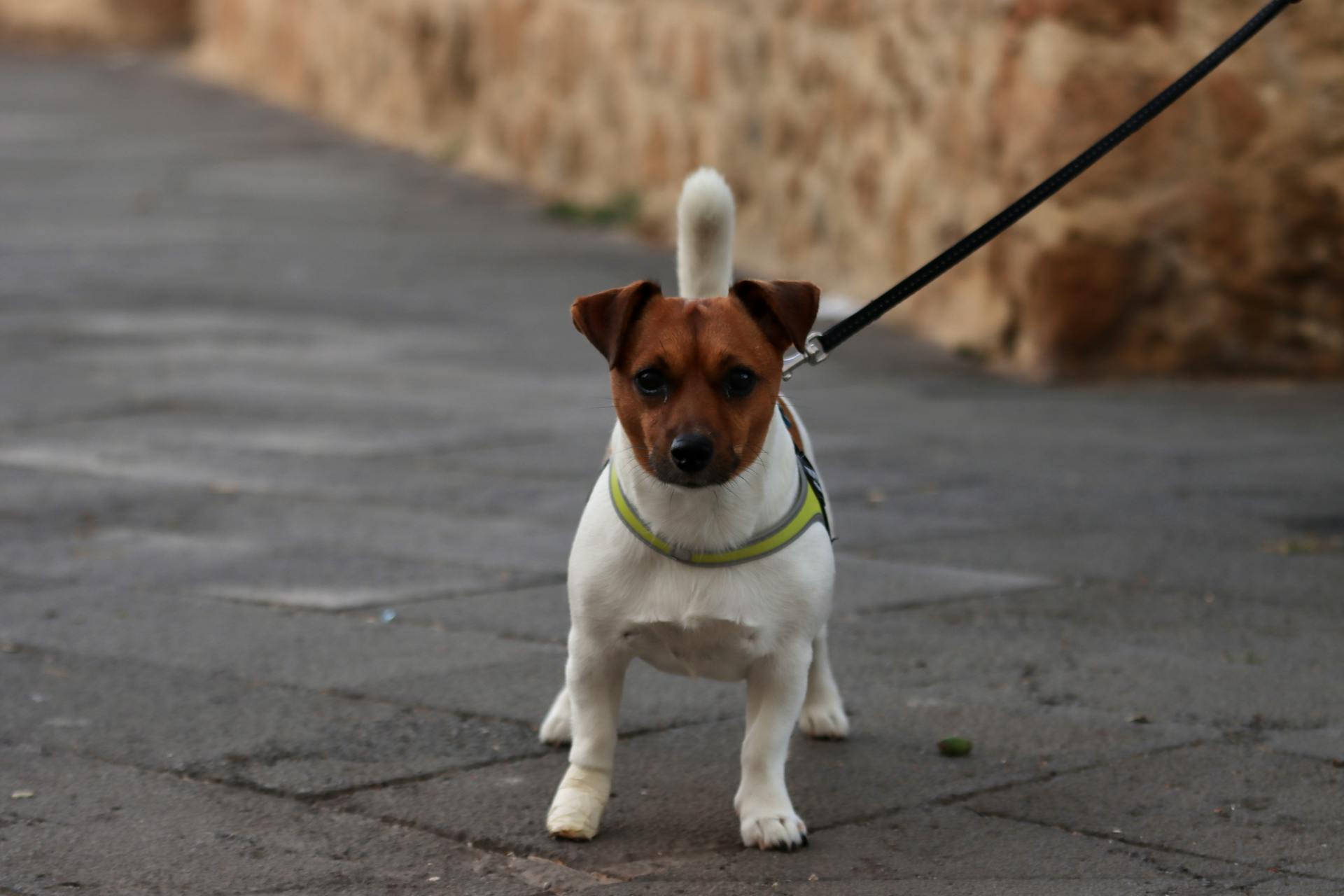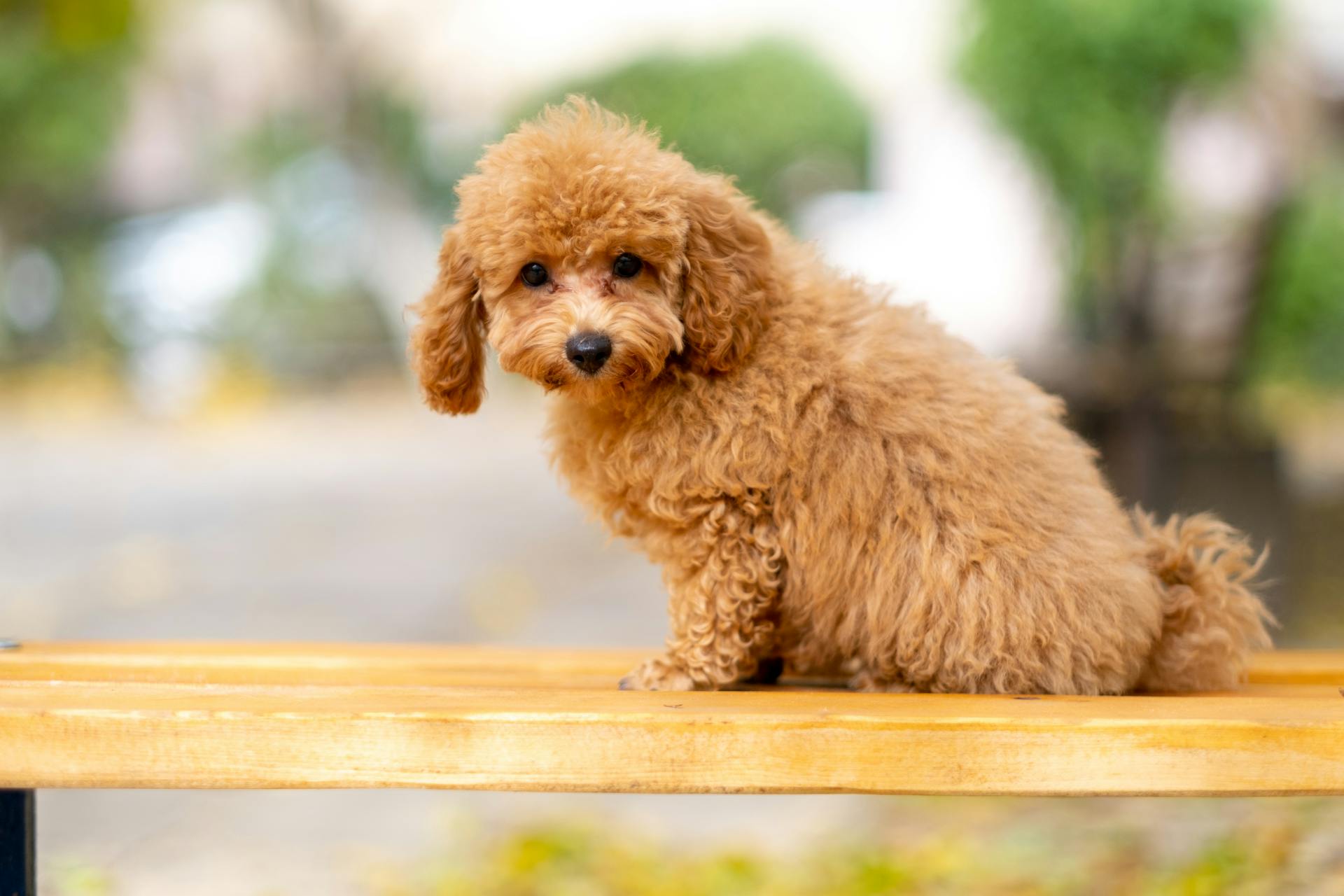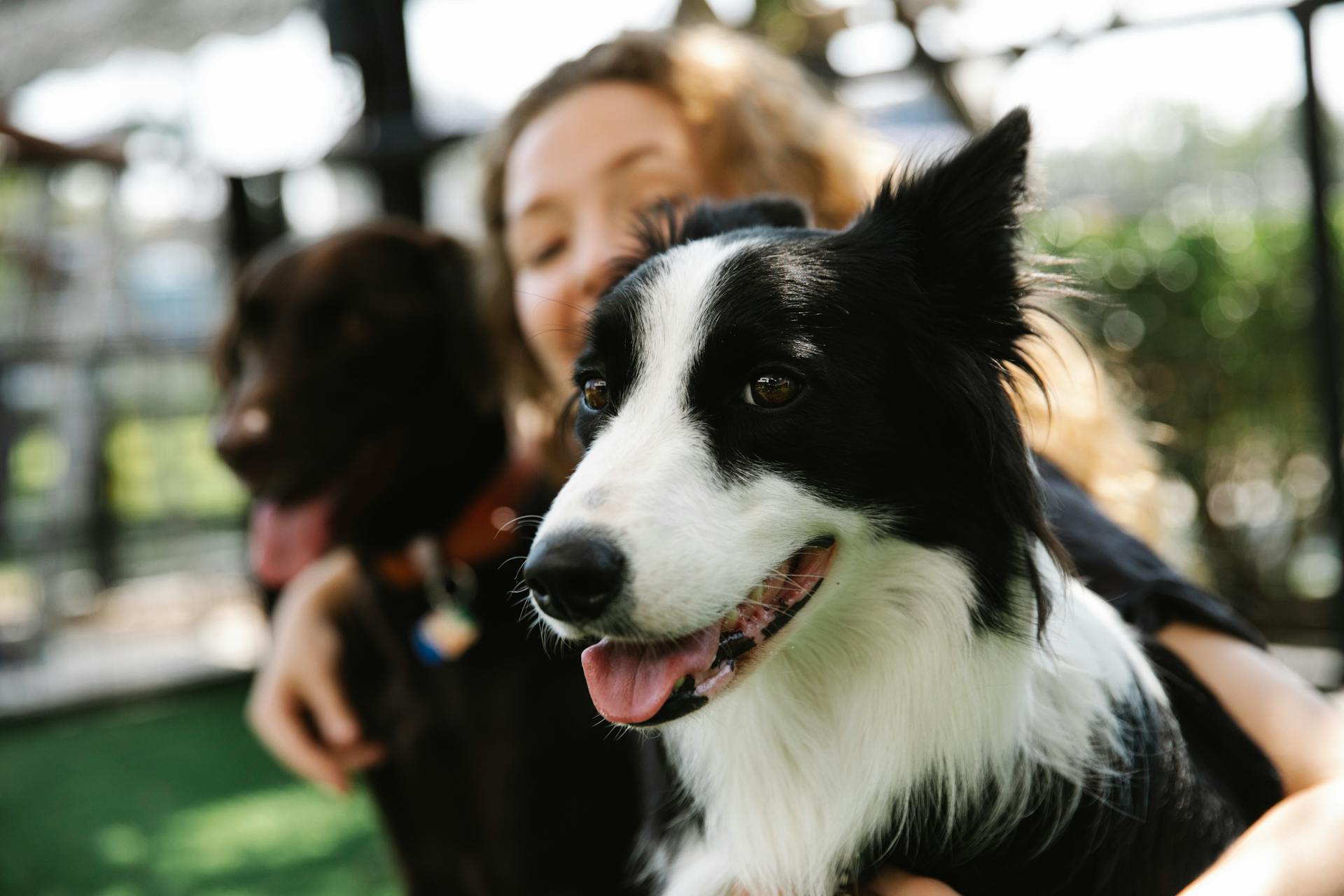
Toy Poodles are often considered a popular choice for people with allergies, but are they truly hypoallergenic? The answer lies in their low-shedding coat, which produces less dander than many other breeds.
Their single-layer coat requires regular grooming to prevent matting and tangling, but this also reduces the amount of loose hair and dander that can exacerbate allergies.
Toy Poodles are a great option for those with allergies, as they produce fewer allergens than many other breeds. However, it's essential to note that no dog is 100% hypoallergenic, and some people may still experience allergic reactions around Toy Poodles.
To care for a Toy Poodle, it's crucial to establish a regular grooming routine that includes daily brushing and regular trimming.
Check this out: Mixed Dog Breeds That Are Hypoallergenic
What Dogs Are Hypoallergenic?
Some breeds are considered hypoallergenic because they release less dander and saliva allergens into their surroundings. Poodles are among the best choices for people with allergies.
Dogs that are commonly considered hypoallergenic tend to have a lower amount of shedding. This is because they release fewer tiny dead skin cells, also known as dander, into the air.
Poodle Breeds
Poodles have a tight, curly coat that hardly sheds, making them a great choice for people with allergies.
Their hair also holds dander and allergens near the skin rather than releasing it, which is a big plus for those who suffer from allergies.
Just be sure to regularly clip their coat, especially for Miniature and Toy Poodles, which are perfect for those seeking small dogs.
Poodle mixes and hybrid breeds with a Poodle parent are also a popular choice for those with allergies, as they inherit the Poodle's hypoallergenic genes.
Some popular Poodle mixes include the Bernedoodle, Maltipoo, Goldendoodle, Cavapoo, Schnoodle, Cockapoo, Labradoodle, and Aussiedoodle.
These breeds are often considered smart choices for those with allergies, but keep in mind that genetics can be complicated, and some Poodle mixes may be less allergy-friendly than others.
Here are some popular Poodle breeds and mixes:
- Bernedoodle
- Maltipoo
- Goldendoodle
- Cavapoo
- Schnoodle
- Cockapoo
- Labradoodle
- Aussiedoodle
Non-Shedding Dogs
If you're looking for a non-shedding dog, you're in luck because there are several breeds and mixes that fit the bill. These dogs are perfect for people with allergies or those who prefer less dog hair in their home.
Some top contenders for non-shedding dogs include the Poodle, which has a dense coat of curly hair that doesn't shed much. This means there is less dander being released into the air and less chance of coming into contact with saliva.
The Poodle's unique coat is due to its single coat, long hair growth cycle, and curly coat that traps loose hair. This makes them a great choice for people with allergies.
You might be wondering if Poodle mixes are also non-shedding. The good news is that they often are, with breeds like the labradoodle and Golden-doodle shedding very little.
Here are some breeds that are known to be non-shedding:
- Affenpinscher
- Afghan hound
- American hairless terrier
- Barbado da Terceira
- Bichon Frise
- Bolognese
- Chinese crested
- Maltese
- Schnauzer
These breeds and mixes are all great options for people who want a non-shedding dog.
Caring for Hypoallergenic Dogs
Poodles are considered hypoallergenic because their curly coat doesn't shed much, reducing the amount of dander released into the air.
To keep your Poodle's coat healthy and hypoallergenic, regular grooming is essential. This breed has a dense coat that requires regular brushing to prevent matting and tangling.
By brushing your Poodle regularly, you'll also be reducing the amount of loose hair and dander that can cause allergic reactions.
Reducing Allergy Triggers
Living with a hypoallergenic dog requires some extra effort to minimize allergy triggers. To keep your home dander-free, try keeping some rooms pretty free of clutter and decorations.
Vacuuming your furniture and carpet regularly is crucial. High-quality air filters can also help reduce allergens in the air.
Poodles, often considered hypoallergenic, still shed less but can trigger allergies. To reduce exposure, keep some rooms free of clutter and decorations.
Using a high-quality air filter can make a big difference in reducing allergy triggers. It's also essential to vacuum regularly to minimize dander and saliva proteins.
Remember, no dog is completely hypoallergenic, but with the right precautions, you can enjoy life with a hypoallergenic dog.
Diet and Supplements
Your poodle's skin and coat health is directly tied to their diet. Feed them a dog food with the right balance of vitamins and minerals to support their skin and fur.
Ask your vet for a recommendation on a great dog food choice if you're unsure. They can help you find the perfect fit for your fur-baby.
Check this out: Do Hypoallergenic Dogs Have Hair or Fur
Adding supplements to your dog's routine is another good way to give them a little extra nutrition. Native Pet's Omega Oil is a great choice, packed with omega-3 fatty acids that boost skin and hair health.
Omega-3 fatty acids also help alleviate joint pain, making them a great addition to your dog's care routine.
Veterinary Checkups
Regular veterinary checkups are crucial for your hypoallergenic dog's overall health, and can help prevent shedding issues.
Parasitic infestations and skin infections can lead to excessive shedding, so it's essential to have your vet examine your pet regularly.
Skin infections can be caused by a variety of factors, including allergies and irritations.
Hormonal disorders like Cushing's disease can also cause increased shedding.
Cushing's disease is a condition that affects the adrenal glands and can be treated with medication.
Shedding and Allergies
Poodles are known for shedding very little due to their single coat, long hair growth cycle, and curly coat that traps loose hair.
Recommended read: How to Cut a Toy Poodles Hair
One of the reasons poodles shed so little is because they don't have a double coat like many other dogs, which means they don't experience seasonal shedding. This is especially great for people with allergies.
Poodle mixes, such as labradoodles and Golden-doodles, also tend to shed very little and are less likely to cause severe allergic reactions.
However, it's worth noting that even though poodles shed less, they can still trigger allergies in some people. Regular vacuuming and using a high-quality air filter can help reduce allergy triggers.
If you're a poodle owner with allergies, consider keeping some rooms in your home pretty free of clutter and pet dander to help reduce your exposure.
Worth a look: Do Toy Poodles Shed
Choosing a Hypoallergenic Dog
If you're looking for a hypoallergenic dog, you're in luck because there are many breeds to choose from. However, it's essential to understand that no dog breed is truly hypoallergenic, as all dogs produce dander and saliva that can trigger allergies in some people.
To find a suitable breed, consider the top contenders listed by Dogtime, which include breeds like the Affenpinscher, Afghan Hound, and Poodle. These breeds tend to release less dander and saliva allergens into their surroundings.
If you're set on getting a Poodle, be aware that while they don't shed much, they still produce dander and saliva, which can trigger allergies. To determine if a Poodle is right for you, spend time around one of these dogs to see if you have a reaction.
Some of the most hypoallergenic breeds in the world, according to the AKC, include the Affenpinscher, Afghan Hound, American Hairless Terrier, and Poodle. Here's a list of some of the most hypoallergenic breeds:
- Affenpinscher
- Afghan Hound
- American Hairless Terrier
- Barbado da Terceira
- Poodle
- Bedlington Terrier
- Bichon Frise
- Bolognese
- Chinese Crested
- Maltese
- Schnauzer
- Irish Water Spaniel
Remember, many hypoallergenic breeds and mixes can be found available for adoption in local shelters, so don't overlook the option to adopt a dog in need.
Frequently Asked Questions
Are poodles 100% hypoallergenic?
Poodles are considered hypoallergenic, but no dog is completely allergen-free. While they may be a good fit for those with allergies, it's essential to understand the nuances of dog allergens.
Sources
- https://www.goodhousekeeping.com/life/pets/g4503/dogs-that-dont-shed/
- https://dogtime.com/reference/132592-hypoallergenic-dogs-best-dog-breeds-that-dont-shed-allergies-pet-dander
- https://nativepet.com/blogs/health/do-poodles-shed
- https://rockykanaka.com/are-poodles-hypoallergenic/
- https://www.dogster.com/dog-breeds/are-poodles-hypoallergenic
Featured Images: pexels.com


